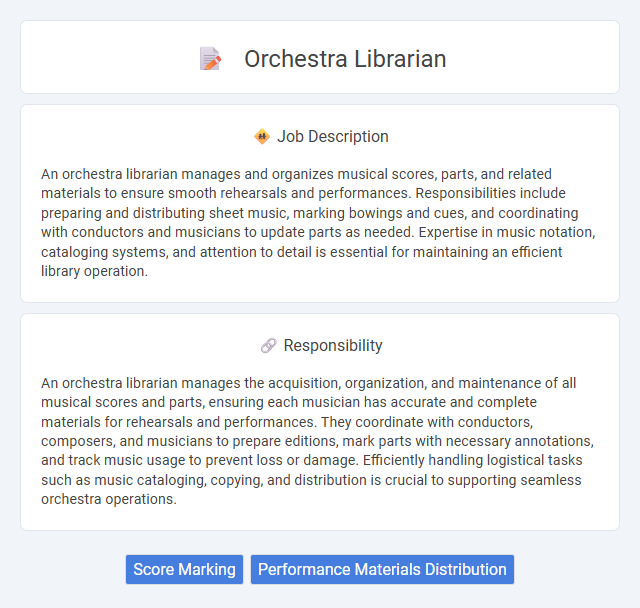
An orchestra librarian manages and organizes musical scores, parts, and related materials to ensure smooth rehearsals and performances. Responsibilities include preparing and distributing sheet music, marking bowings and cues, and coordinating with conductors and musicians to update parts as needed. Expertise in music notation, cataloging systems, and attention to detail is essential for maintaining an efficient library operation.
Orchestra librarian positions may be suitable for individuals who are highly organized, detail-oriented, and have a strong passion for classical music. People with excellent communication skills and the ability to manage large volumes of music scores under tight deadlines could likely thrive in this role. Those who prefer a behind-the-scenes job rather than a performance-based career might find this profession particularly fitting.
Qualification
An orchestra librarian requires a strong background in music theory, score reading, and cataloging to manage and organize musical materials effectively. Proficiency in digital music libraries and familiarity with various scoring software enhance the ability to prepare accurate parts for rehearsals and performances. Attention to detail, excellent organizational skills, and experience working closely with conductors and musicians are essential for the role.
Responsibility
An orchestra librarian manages the acquisition, organization, and maintenance of all musical scores and parts, ensuring each musician has accurate and complete materials for rehearsals and performances. They coordinate with conductors, composers, and musicians to prepare editions, mark parts with necessary annotations, and track music usage to prevent loss or damage. Efficiently handling logistical tasks such as music cataloging, copying, and distribution is crucial to supporting seamless orchestra operations.
Benefit
Orchestra librarian jobs likely offer benefits such as access to a rich cultural environment and close collaboration with professional musicians. This role probably provides opportunities for skill development in music organization, notation software, and performance preparation. There is a good chance that the position includes networking advantages within the classical music community and potential exposure to unique repertoire and rehearsals.
Challenge
Orchestra librarian roles often entail managing extensive music collections and ensuring accurate, timely distribution of scores and parts, which can be highly challenging due to tight rehearsal schedules and last-minute changes. The probability of encountering complex organizational issues increases when coordinating with conductors, musicians, and publishers to maintain an efficient workflow. Handling these challenges requires meticulous attention to detail and strong problem-solving skills to support seamless performances.
Career Advancement
Orchestra librarians manage and organize musical scores and parts, ensuring seamless performances and rehearsals. Skilled librarians with expertise in music cataloging and digital archiving often advance to senior librarian roles or specialize in orchestral administration and music production. Networking within professional music organizations and continuous education in music technology significantly boost career growth opportunities.
Key Terms
Score Marking
An orchestra librarian specializing in score marking meticulously organizes, annotates, and prepares musical scores and parts to ensure seamless rehearsal and performance conditions for musicians and conductors. This role involves detailed transcription of conductor's notes, bowings, and cues directly onto the parts, optimizing sightlines and reducing errors during live performances. Expert knowledge of orchestral repertoire and notation software is essential to maintain accuracy and efficiency in score management.
Performance Materials Distribution
Orchestra librarians specialize in the precise organization and distribution of performance materials, ensuring that musicians receive accurate and timely sheet music for rehearsals and concerts. They manage the preparation, marking, and maintenance of all scores and parts, facilitating seamless communication between conductors, performers, and music publishers. Expert handling of digital and physical materials enables orchestras to perform efficiently and maintain high artistic standards.
 kuljobs.com
kuljobs.com